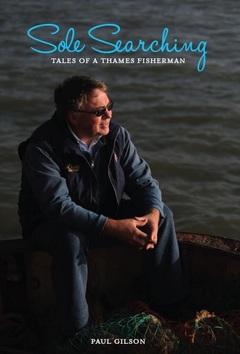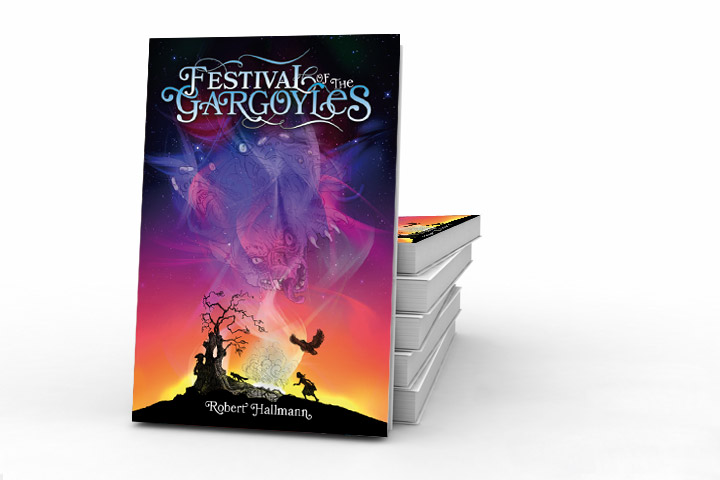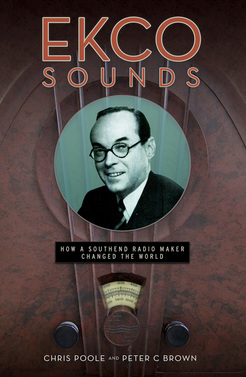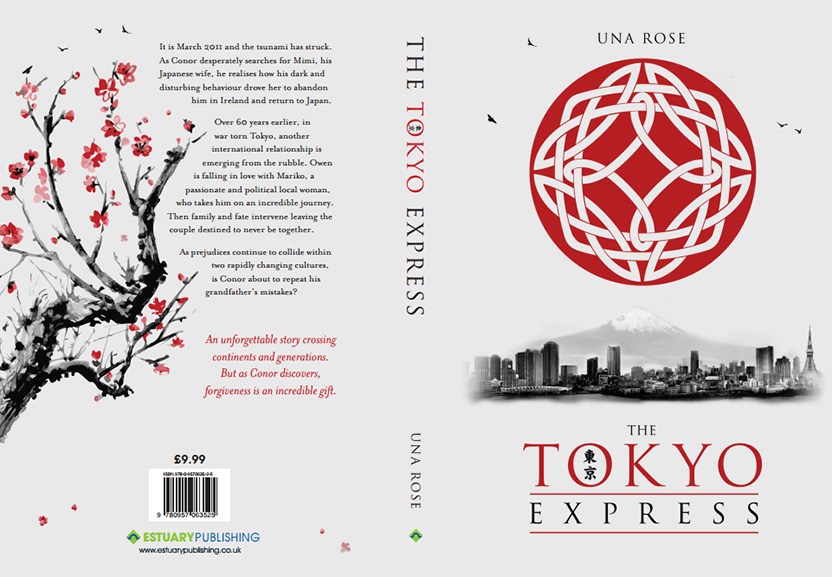|
The third guest on this Book Talk page is Leigh-on-Sea based publisher and author Audrey Snee. Ms Snee is a truly cosmopolitan individual: brought up in North London in a close-knit Irish community, she has lived, studied and worked around the world. An experienced international journalist with a love of books and story-telling, she decided in 2011 to launch her own publishing imprint, Estuary Publishing, specialising in tales of the Thames estuary. In 2012, Audrey published (under her nom de plume, Una Rose) an accomplished debut novel, The Tokyo Express, which has received some glowing reviews. At the core of the book the reader will find two poignant love stories that bridge the gap between Ireland in the 21st century and Japan in the aftermath of WW2. Below I speak to Audrey about independent publishing and the inspiration behind her evocative and well-researched novel (the cover design is also beautiful!). Audrey, you set up Estuary Publishing back in 2011. Could you tell us what made you decide to take the plunge? After all, becoming a small independent publisher in a business which has been dominated by traditional publishers (bigger and bigger corporations who keep merging together and dictating the public’s tastes) is no mean feat. What drove your decision? I was helping a local fisherman, Paul Gilson, edit his short stories which he had ambitions to turn into a book. I had interviewed him several times in my role as a journalist and when he sent me some of his stories I realised he had great potential. At that point I didn't envisage actually publishing other people's books, although I had ideas of setting up an independent publishing company as I had written a novel myself and been on a self-publishing course. Then fate played a card. I was speaking to a local author who was curating a new event for Southend, a bi-annual literary festival of the sea and she lacked a voice for the fishing community! I told her about my fisherman contact and his book, and within minutes we were booked to speak at this prestigious event. Both Paul and I realised this was a golden opportunity to get the book into print. The talk we did at the festival was a sell-out and soon after the book called Sole Searching came out, that too became a local best-seller! Did you meet any particular obstacles whilst setting up? The biggest obstacle for any new venture is of course money! I had some savings which I used and I have kept the business very low scale, employing specialists such as designers and editors on contract. I find my skills of a journalist have translated well into publishing. You need to have good people skills in this business to get your foot in the door to retailers and to get media publicity. Being able to write a press release is a huge bonus! Of course obstacles exist in this ever declining industry where retailers are often more interested in Z-list celebrity biographies than original fiction/non-fiction, and where independent authors and publishers are considered less professional than the “traditional” published work. However the rapid rise of the e-book phenomenon and readers able to express which books they enjoy the book direct to other readers is breaking down those barriers and offering far greater opportunities to independents in the book world. The Estuary Publishing tag line is: “Bridging the Thames with Words”. Could you tell us a bit more about the identity of the imprint and the way it is rooted in the Thames estuary? Why Southend/the Thames estuary? I worked for several years at the Southend Echo and was always struck by the real passion in the town for the local history and literature. Yet there was no company focusing as such on this eager market! Southend has a rich history of writers and the location has been featured in many books, films and TV shows. It is also derided at times in the media as some sad Essex coastal town known for its benefits claimants and summer beano drinkfests. I felt that the town has so much to offer and by focusing on it and giving the passionate readers that live here more of the books they love reading, there was a business opportunity to grab. My company does more though than just publish local books. I am involved in many book events, as well as promoting literature in local schools and running a very popular online forum for other authors called SWAN, which stands for the Southend Writers and Artists Network. It currently has 333 members and is open to anyone with a link or interest in Essex and writing/art. As a publisher, what were you after when you started looking for authors? What particular elements make you decide to sign someone to Estuary Publishing and convince you that they would fit in with the ethos of the imprint? The ethos of the imprint is to tell a story of Southend/Essex/Thames Estuary region that is little known or not at all. Or as in the case of Robert Hallmann's excellent tale Festival of the Gargoyles. He takes the reader back to the mid-1800s when the smugglers ruled everything even the churchmen and although authority existed, they usually had a way to deal with that. That is until they encounter the feisty daughter of the new tax inspector who is equally if not more cunning than they are. As an avid historian, Robert was able to get into the minds of the simple people who at that time believed everything they were told and also allowed themselves to believe that what was even impossible to believe. It was an era of witch-hunting but this book only lightly touches on that (as that storyline can be rather cliché especially for Essex!) as it shows how smuggling was a way of life for most people, not just criminals with little known facts about the region delicately revealed. Likewise when I met with Chris Poole, the first author of Ekco Sounds, I knew he was offering a very unique collection of voices from the past. He had a passion for the company both he and his father worked at and so once retired began collating information about and stories from previous employees of EKCO, a company that at one point employed over 7,000 residents of Southend and surrounding area. Sadly Chris died before his book even began the editing process but his good friend and fellow author Peter C Brown took over the job and produced an excellent account of the rise and fall of a remarkable company and its founder, Eric K Cole. This book wouldn't have also been possible if not for the great assistance of Eric's son Derek and the nephew of Chris who assisted with the handover of copyright and other legal matters. As with all my authors, they live in the town and share the passion for telling its story. They can be counted on to promote the book, attend events and help boost sales. This is a vital element of who I choose. After several years of running your own imprint, what lessons have you learnt so far? Have there been any good/bad surprises? And what would make it easier for you as a director of a small publishing company (apart from more money?) The best and worst bit are the same really. Running a business single-handedly means you do get all the praise but it is a hard uphill struggle to get established, make good contacts in both the printing and supply trade as well as with the public, media, vendors. I get huge satisfaction at what I have achieved but also sad that it could be so much bigger and better if I were to have investment or that nationwide best-selling title! We are in the middle of a publishing revolution, with new independent imprints emerging and self-publishing attracting a lot of interest; still, the “market” and the media are still dominated by the big traditional publishers and agents still decide who makes it or not. Traditional publishing, big literary festivals and the media are still very snobbish about small imprints and self-publishing even though there is so much great talent and quality publishing out there. What would it take for the decision makers to listen and take us seriously? The biggest hurdle to cross for all independent imprints and authors is for even a best-selling self or independently published title to be given the same gravitas as a traditionally published one. But to enter the biggest book competitions such as the Man Booker for instance, you or your publisher have to be able to supply 1,000 copies and also offer funding of up to £10,000 to promote your book if chosen. This provides a sufficient enough hurdle for most non-traditionally published authors. I think if a film producer were “brave” enough to take on a self-published title for a film, it could turn the tide, but sadly they rely on agents and/or prize winning books, so for now the gateway is still closed off to us mere mortals! I find it quite interesting that someone who really is a global, international individual (you have lived and worked in the Far East and you speak several languages) has set up a “locally minded” imprint. Coming back from Asia after five years, I certainly didn't think I would get into parochial matters but once the children came, life did settle down (although right now we are making plans to all move abroad again!) My idea for the locally-minded imprint came from hearing about the love in Southend-on-Sea of its history and heritage when I was a journalist on the local newspaper. I did my research and learned that the local Waterstone's special local history section and is their best-selling. I think more publishers ought to look at their local readership, rather than trying to tap into an already crowded and shrinking national/international market. You are also a writer. Under the author name Una Rose, you have published your first novel, The Tokyo Express. Did your own experiences and background as a journalist both abroad and in the UK influence your writing, and in what way?
Absolutely, I have several more books I want to write about my personal experiences in Asia. I had an incredible first-hand experience of working in the sporting world and the International Olympic Committee, as well as some incredible assignments in my role as an Asian correspondent for many newspapers and magazines. I also studied in Kiev, Ukraine as part of my Russian degree, just as the whole Soviet Union was imploding, which I feel is another a story worth telling! I have also started a novel set in the last 100 days before the Hong Kong Handover, a bizarre moment in world history. The Tokyo Express packs in a lot of things: the 2011 tsunami, modern Tokyo, culture clashes, the impact of WWII on Japan, dysfunctional families, repressed environment, a rural Ireland still under the influence of Catholicism… Could you let us know a little bit about how the ideas for the book came into your head and how you shaped your characters? It was a process that took time and I find swimming is the best way for me to think through a storyline as aside from breathing, I have nothing else to distract my mind with. The characters are never based on one person alone, more an amalgamation or formed from a brief encounter with a stranger who leaves an impact. Sometimes I take descriptions from people I see opposite me on trains. But once they are “born” in my mind they take on a real form and I ask myself, so how would Mimi respond to this then? I begin to know more about their personalities the more you think about them as you would a friend. The story lines sometimes again are “borrowed” from conversations. The scene of the priest and Conor aged 7 was one told to me by someone I met at a student party who in his drunken state needed to tell someone. I listened and was so shocked by it (this was before the Saville or church exposures of widespread child abuse) it somehow stayed deep in my memory and I knew it was something I must tell sometime. I am personally unfamiliar with the cultures of Japan and Ireland. Those two countries are still steeped in tradition but have enjoyed their own economic booms and successes (although I am not too sure what’s happened to the Irish Tiger?). Japan seems to have bounced back. How well do you know those two cultures and what is your own relationship with them? There is a song by The Vapors, a British pub-rock band, called “I'm turning Japanese”. I used to sing it all the time while I lived in Tokyo as despite everything I tried, the culture and customs are so strongly observed, I found myself following them without realising. Even after I left, I would be drawn to any news or book about the country. You could say it seeped into my soul ever so slightly. Also deep within is my Irish soul, my parents, grandparents, etc, have all been Irish. Although I grew up in North London, I was in an Irish community. I first wrote the main love story of Conor and Mimi returning to Ireland and the 1945 tale but realised the story needed a hook to engage with readers other than those with an interest in Japan or Ireland. When the Tsunami hit, I realised this was an ideal opportunity to connect with readers of all ages and gender, as we all recall those horrific scenes on television. To include this also helps to show the modern day Japan as it has had such an impact on the country and shaken it up just as after WW2. People are listening less to the government and officials and making up their own minds about matters – this really didn't happen before this disaster as the teaching is always listen and obey elders. Japan is slowly recovering from recession but the Japanese are naturally cautious and the biggest savers in the world. Investing in Japan is considered a safe bet. Also people forget there was an earthquake in Japan too, the “big one”, which was expected for over 20 years. It actually didn't cause as much damage as expected thanks to the earthquake-proof technology that allows tall buildings to move on rollers in their foundations. I experienced several “minor” earthquakes and I can tell you it is a very frightening experience. As for the Celtic Tiger, it was roaring for about a decade and then has quietly gone to bed as government and local officials are being proven to have been corrupt. Ireland has more unfinished housing developments than graveyards now. It changed the national character of Ireland too. People became needy and greedy, houses bigger, cars flasher, dresses and shoes to out-do the Kardashians! Some people got fabulously rich but far more are still in awful debt trying to still live the “dream”. Ireland was once a haven from all the commercialisation and a place where people had time to laugh and take life at a slower pace, alas for most now this is no longer possible. Taxation is on average 50% and young people work as hard as those in Manhattan. I have to admit that I found Conor consistently infuriating and wondered about his motivations: why on earth did he come back and stay to take over the pub and live with his horrendous mother? Why didn’t he tell everyone to go to hell (ha ha!) and left them to their own devices and left the country again? What made you decide for everyone to remain in Ireland even after what had happened (and you are being honest presenting it as a suitably grim place, almost Gothic in its strange bleakness at times). It reminded me of descriptions of the South of the US, all religion and hostile and repressed inhabitants who seem to be already half-dead and hide a lot of family secrets… Conor was deliberate. He is a “Marmite” character, you either absolutely hate him (most people do, at least until they really get to know him) or you love him. There are people out there who genuinely do. In fact I was once stopped in a supermarket by a reader who had recently bought a copy from me at a signing, and told in no uncertain terms I must bring him back again in another book! She loved his vulnerability. Reviewers too have remarked on him, which can only be a good thing as it is a character that lives on in their memory. Is Ireland so bleak, no, but it is for Conor and for that matter his mother who cannot escape it. In the past people really did have their lives scrutinised by neighbours and the church. My grandmother told me many such stories. I felt by showing how warm everyone is to Mimi that everyone else (except the Flanaghan family) has moved on and is willing to embrace her and a new way of thinking. Conor returns because it is still his “home” which is a very strong emotive to a lot of Irish diaspora. I was also surprised that such a clever and modern girl like Mimi would like Ireland and stay so long. I thought she was a very interesting character and really added a little bit of magic to the story; she seems to be this beneficial good fairy looking over Conor and his dysfunctional relatives. But again, I would question her motivations: why did she set up shop at the end with Maureen? Is it all about forgiveness? [PS: the bit where Mimi walks into the church wearing her Japanese clothes is simply superb. It would work great in a movie (slow motion, etc.)] Mimi is an only child who has lost everything in Japan and is pregnant. Is it not then a wise move to be with her estranged husband's family? She lost a grandparent in the great Canto Quake in the 1920s and now her parents in the latest quake – it would make you think if it is a place to bring up a child if you have a choice to be somewhere else. Maureen has her awakening and realises if she wants change she has to make it happen and getting rid of the bar eases her workload. They become closer with Conor absent and with the arrival of the grandchild. The scene of Mimi at the church is my favourite scene and plenty have commented on the film-like quality of the book. In fact one reviewer on Goodreads said it would be better as a film than a book and plenty of others have echoed that sentiment. My most recent reviewer went as far as to say: “The Tokyo Express is quite a long read. However, it is near flawless in its writing, deeply-researched in its scale and scope, beautifully presented and highly enjoyable. I’m surprised it hasn’t been picked up by a major publisher.” (Reviews are posted at this link: http://amzn.to/1O7JUzX) Your descriptions of the tsunami-ravaged landscapes and of a defeated Japan after WWII are very evocative and a real success. Could you tell us a bit about how you worked on your research? I buried myself deep in the library of the School of Oriental and African Studies in London unearthing some real gems, books written for US servicemen for when they arrived in Japan and books also written in the 1940s for Japanese to understand the “gaijin”. It helped to be able to read some Japanese to navigate through it. However my best research came from speaking to a lovely gentleman in Japan who was seven years old when the Americans arrived and his memory is still so vivid of the whole experience. His own father, who was a minor official in the Imperial Government, was put in prison as a POW for nearly a year so his mother forbade him from speaking to the Americans, but he said it was impossible as they were so friendly and of course had lots of sweets for the kids. As for the tsunami scenes, I absorbed myself in every media coverage of the event with the realisation I could have so easily been caught up in it myself. While I was living in Japan, there were many real warnings it was imminent. Have you based Owen’s lover Mariko Hayashi on any real Japanese politician? No, but I read only recently of a woman who could have so easily been Mariko who only died very recently. She helped the Americans to draft the post-war constitution. If a movie were made of your book, which actors would play Conor and Maureen? I would love Ewan McGregor to play Conor and Imelda Staunton for Maureen. What’s next for Estuary Publishing? Do you have any new signing in mind? I am working on some children's books with my teenage daughters who are illustrating it. I am also hoping to commission a book about The Endeavour, a Dunkirk Little Ship which has been restored and returns again this year to Dunkirk for the 75th anniversary of Operation Dynamo. Are you working on some new ideas for a novel at the moment and will they be very different from The Tokyo Express? I have several novels I wish to write based on my travels and life in Asia and the Soviet Union, as well as a first person account of my working relationship with Japanese table tennis legend Ogimura. Which authors inspire you? Who are your favourite authors/books? I am happy to see my girls enjoying the same books I loved as a child, such as Daphne Du Maurier and Jane Austen, especially given the current fashion for fast-paced American teen literature. Aside from such classics, I am drawn to cosmopolitan writers such as Roma Tearne, Andrea Levy and Monica Ali, and travel fiction authors like Paul Theroux. I am currently reading an independently published novel called Heartbreaker by Nick Louth, which is taking me into complex world of Middle Eastern politics and religion with great ease and a great love story to boot! I love to learn about a place as well as be captured by a great plot and characters. You can buy all the books mentioned above from the Estuary Publishing website. The Tokyo Express and Festival of the Gargoyles will be part of Arcane Publishing's stock at The Unit @The Customs House, West Bay, Dorset, from August 1st.
0 Comments
|
AuthorHi! Welcome to Book Talk Archives
May 2015
Categories |





 RSS Feed
RSS Feed
